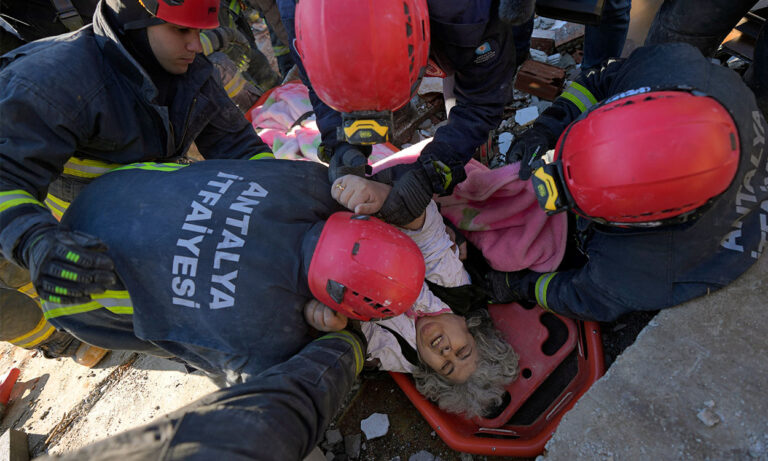Trapped civilians turn to social media following the catastrophic earthquakes in Turkey and Syria

On 6 February 2023, in the early hours of the morning, a devastatingly strong earthquake—which was reported as a 7.8 magnitude on the Richter scale—struck Turkey and northern Syria while people slept. 12 hours after the first earthquake hit, a second massive wave occurred. According to the most recent reports, the combined death toll of those in both countries is currently at 1,500, but it is expected to increase over the coming days.
Turkish President Recep Tayyip Erdoğan has described the event as the country’s largest disaster since 1939, adding that 45 nations so far have offered their assistance. Speaking with The Guardian, Dr Steven Godby, expert in natural hazards at Nottingham Trent University, stated that “unfortunately the death toll is likely to climb quickly. The earthquake struck early in the morning when people will have been asleep at home and the weather is very cold meaning those trapped in rubble face the threat from low temperatures.”
The expert added: “The challenge is further compounded by the fact that there are already large numbers of displaced people in northern Syria as a result of the civil war.”
Extensive ground rescue efforts are currently taking place. The White Helmets rescue service, a volunteer medical organisation that operates in parts of opposition-controlled Syria and in Turkey, has reported that hundreds of Syrian civilians are still stranded amid the wreckage.
NW #Syria in a state of catastrophe after 7.8 magnitude #earthquake. Destruction, devastation, and collapse of buildings. Hundreds of injuries, dozens of deaths, many trapped under the rubble or stranded in the winter cold. We call on the international community to take action. pic.twitter.com/rtzqRJa8IP
— The White Helmets (@SyriaCivilDef) February 6, 2023
Shortly after the first earthquake occurred, pleas for help and videos of crumbling homes and buildings began to flood social media:
I have tears in my eyes .
— Dr Ayesha (@Dr_AyeshaNavid) February 6, 2023
Dear Allah , please have mercy #TurkeyEarthquake pic.twitter.com/Kcnx6wX4hv
Civilians trapped under rubble, unable to call for help, turned to the internet to try and reach out for aid and assistance:
Many family still under the rubble, they need urgent help in #Güzelburç
— Chaudhary Parvez (@ChaudharyParvez) February 6, 2023
Update- 1006 Killed & 5790 injured.#deprem #Idlib #Syria #DEPREMOLDU #TurkeyEarthquake #Turkey pic.twitter.com/usRToQw4aG
With emergency lines overwhelmed, dozens of people have also been live-streaming from their locations. As reported by The Telegraph, one Instagram video showed a young man, living in the city of Antakya, streaming from his pitch-black bedroom. In it, he can be heard crying into the phone and asking if his mother, who was sleeping next door, was still alive.
Calling for help, the video picks up him yelling: “Mum, are you okay? Please tell me! Are you next to your bed or what? Mum, are you okay? Our building has collapsed. We’re in Hatay, Antakya.”
Other videos posted online captured a woman trapped underneath a torrent of rubble and a father reaching out for his son who had become stuck after their home collapsed:
Videos of a woman who filmed herself trapped under earthquake rubble and a father calling out to his son, reveal the desperate situation people are facing across Turkey and Syria as they wait to be rescued ⤵️ pic.twitter.com/7aV244m9TY
— Al Jazeera English (@AJEnglish) February 6, 2023
We’ve seen previously the power social media can wield when natural disasters strike. It can deliver minute-by-minute updates and provide emergency response units key information—particularly in regard to recovering and locating missing families and individuals.
As emphasised by the Global Disasters Preparedness Centre (GDPC), social media can help mobilise volunteers, notify friends and relatives, manage misinformation, and contribute access to relief funds where individuals can donate money towards financing the efforts.
Its usefulness also doesn’t disappear once the crisis is deemed over. These platforms can facilitate recovery and provide information regarding reconstruction efforts and future next steps—all things invaluable to those impacted by the disaster.
The search and rescue operations across Turkey and Syria are expected to continue over the upcoming days, with more than ten teams from the European Union mobilising to help and provide crucial resources. The US, UK, Israel, Russia and China are among other nations to have made public offers of assistance.
Users will undoubtedly persist in keeping emergency services up to date with any and all vital information regarding those trapped under the rubble.





